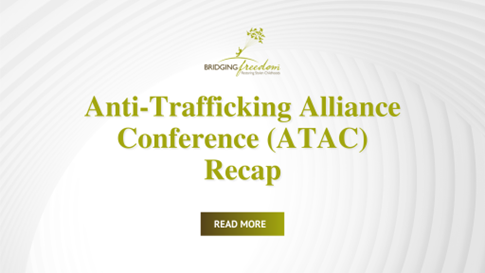From January 24-25, Bridging Freedom had the pleasure of attending the Anti-Trafficking Alliance Conference (ATAC) in Charlotte, North Carolina. This year’s event brought together a wide-ranging group of professionals who are all committed to protecting survivors, prosecuting traffickers and buyers, and preventing trafficking. The group included healthcare experts, law enforcement officials, victim advocates, and anti-trafficking organizations similar to Bridging Freedom. From inspiring keynotes to interactive workshops and panel discussions, attendees were able to learn from experts across the anti-trafficking field.
We learned priceless information at the ATAC conference that we want to share and recap. Read along to learn what we learned from the 2024 ATAC conference.
Breakout Sessions
This year’s ATAC conference featured four highly informative and impactful breakout sessions for attendees. Whether participants had firsthand knowledge in these areas or sought to expand their understanding of new topics, these breakout sessions provided an excellent opportunity for individuals to gain deeper insights into the initiatives made within the anti-trafficking community and ways for them to contribute actively. Let’s take a closer look at the specifics of each breakout session:
-
Healthcare & Frontline Response
Given the significant interaction between trafficking victims and healthcare and frontline response workers, they must equip themselves with the knowledge to identify and report potential trafficking scenarios within their workplaces. This breakout session provided attendees comprehensive guidance on recognizing and reporting such situations and offering survivors essential resources. Participants learned to discern subtle indicators of exploitation, ensuring timely reporting to the appropriate authorities. Additionally, the session covered survivor support, available resources, and strategies for responding in a trauma-informed manner.
-
Law Enforcement
Given that trafficking victims often fear law enforcement, law enforcement personnel must be well-prepared in addressing trafficking situations. This breakout session focused on instructing attendees on the appropriate approach for law enforcement to undertake trafficking investigations and prosecutions with a victim-centered mindset. Leaders trained officers and their partners during the breakout session on effective methods to interact with and safeguard trafficking survivors. Adopting a victim-centered approach ensures that survivors’ needs, safety, and well-being remain the foremost priority. As a result, this approach helps minimize re-traumatization while building trust between survivors and law enforcement.
-
Service Providers & Government Agencies
Service providers and government agencies must possess the essential tools and information to offer optimal support for survivors since each survivor’s story presents unique challenges, and preparation is key to handle any situation effectively. This session focused on strategies for individuals, staff, and multidisciplinary teams to refine their approach. The conference leaders lead attendees on evidence-based practices proven to offer the most effective support for survivors on their path to healing and freedom.
-
Leadership (Designed for Leadership Level Positions)
Unlike the other breakout sessions, this one was tailored for leadership-level positions, aiming to empower their teams. Recognizing that strong leadership is foundational to the success of any organization, it was essential to incorporate this aspect into the conference. This session focused on equipping attendees with the necessary tools to inspire their teams through collaboration, positivity, and productivity. It encompassed learning strategies to support survivors effectively and harnessing organizational resources to combat trafficking.
Day 1: Trust Building
Earning trust becomes more difficult to grant it to people as you get older. With established trust, businesses will thrive. Leaders must prioritize and foster creating an environment that allows trust to flourish.
On the first day of the conference, speakers emphasized nurturing trust among conference members themselves and in the collective mission to combat human trafficking. Trust is pivotal in this fight and in providing support to survivors. Understandably, victims of human trafficking may struggle to trust others after enduring such traumatic experiences; they’ve been conditioned not to trust anyone.
Throughout the day, attendees had the opportunity to learn from experts across various fields who utilize trust to serve survivors and offer direct care. The day concluded with an engaging discussion exploring strategies for enhancing trauma-informed care, cultural competence, and sensitivity to survivors’ needs while providing all team members with actionable intelligence.
Day 2: Collaboration
Combating human trafficking requires a collaborative effort centered around the well-being of survivors. Recognizing the power of our language and fostering mindful conversations are pivotal in aligning everyone’s mission to combat this crime.
Human trafficking presents multifaceted challenges, demanding collaborative approaches. On the second day of the conference, attendees learned strategies for developing and implementing coordinated response protocols while prioritizing the safety and welfare of at-risk individuals. Our leaders emphasized the importance of collaboration among donors, law enforcement agencies, service providers, safe houses, and survivor recovery programs.
Each session and lesson provided attendees with the most effective coordinated responses and practices for various fields. Attendees departed these sessions equipped with tangible tools and resources to foster collaborative anti-trafficking efforts within their workplaces and communities.
Bridging Freedom
Our team serves as an advocate for restoring stolen childhoods. At Bridging Freedom, we aim to combat domestic minor sex trafficking through our restoration programs for rescued victims by providing therapeutic safe homes for victims. Aside from providing services for victims, Bridging Freedom aims to educate the community about the horrors going on behind closed doors.
Through partnerships with Clearwater / Tampa Bay Area Task Force on Human Trafficking, Tampa Bay FBI Innocence Lost Initiative, and St. Petersburg College Center for Human Trafficking Awareness, Bridging Freedom can help provide victims with a safe place and connect them to necessary resources. In order to allow us to continue doing what we do, Bridging Freedom relies on the generosity and collaboration of our community of supporters. If you would like to be a part of our group of supporters, then we encourage you to donate online at the webpage here.

